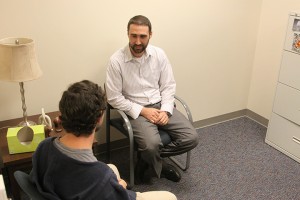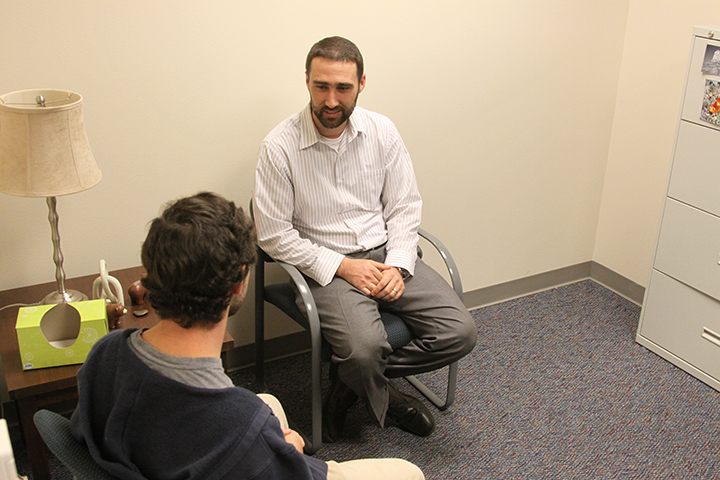
By Hayley Gibson
and David McLain
Reporters
Lacking awareness of counseling benefits is causing some international students to look elsewhere for advice in times of high stress.
During the peak of counseling sessions, faculty members are concerned about the additional pressure international students face in adapting to a new environment alone.
While counseling services may be an outlet of support via the Baylor Counseling Center in the McLain Student Life Center, currently there is no program specifically for international students, nor is there a specific counselor designated to receive them, according to Dr. Jim Marsh, Baylor counseling services director.
“We do see international students for sure,” Marsh said. “We don’t specifically break out international students.”
International students are not typically aware of these services and seek other means of support in times of stress, often from residential chaplains or language teachers, said Trevor Stephen, Brooks Flats residential chaplain, where a large number of international students reside.
“Early in the semester they hear about it at orientation, but later that info isn’t as fresh in their minds and they don’t know about the services,” Stephen said.
International students may face stress that requires counseling, which can sometimes lead them to contemplate withdrawing from Baylor, according to Heather Fritz, coordinator of academic enrollment management.
When international students face such a significant amount of stress that they decide to return home, Fritz is the final Baylor employee students receive advice from before they finalize their decision to leave Baylor.
“We certainly deal with people who are very distressed and it appears to them that they only have bad choices,” said Fritz. “It requires compassion and delivering hard news and info so students don’t see that situation as hopeless.”
Although Baylor does not have counseling services specifically for international students, there are safeguards designed to help students thinking about withdrawing from Baylor.
One safeguard is the Students of Concern Board, which is a multi-disciplinary team of faculty members from departments all over campus. Members of the board meet once a month to discuss any Baylor student referred to them by professors, student organizations or resident hall directors.
Melanie Smith, international student relations coordinator, is the advocate for international students discussed by the board.
“If any of those students are international, we put our resources together to help them,” Smith said. “That might include academically, legal resources, tutoring or counseling.”
However, some international students are wary of the help available to them because of a negative cultural stigma attached to counseling.
“There are perceptions of these services that counseling doesn’t have a positive connotation,” Stephen said.
However, in Smith’s experience, international students she interacts with have either gone to counseling on their own or have allowed her to take them to counseling sessions.
“They have never said, ‘No I’m not going to do this because of my culture,’” Smith said. “Even if it’s not something they do in their own country, they will do it here. They see that we will be sincerely confidential about it and that gets them the help they need.”
Like domestic students, there are many different causes of high stress for international students, many of which result from entering into a new environment.
“Culture shock plays a role,” Stephen said. “That adaption period might be a bit of a struggle. There is the pressure of classes; they need to create a support systems, which is the most challenging.”
Baylor does have opportunities for international students to develop these support systems outside of classes. One avenue is the Global Living and Learning Center housed in Brooks Flats. Currently only six of the 54 students enrolled in the community are international students.
Kenta Okuyama, a Tokyo exchange student from Hosei University, was able to work through a period of stress with the help of friends he made through his Global Living and Learning community and the Japanese language professors he was referred to by the faculty members of Global Living and Learning.
“I think, because I’m an exchange student and this is my first time in the United States, the first couple of months were rough,” Okuyama said. “Now I have good friends in America, American students, and I go to their house very often.”
Okuyama said he was not likely to use Baylor Counseling Services, instead opting for advice from the relationships developed with friends and professors over the course of the semester.
Holly Joyner, director of the Global Living and Learning community, said faculty-in-residence are selected specifically for their ability to interact and relate to students, which provides an additional safeguard for students.
Joyner said Jonathan Tran, the faculty-in-residence for Brooks Flats, was chosen because he relates well to international students. These are things the community puts into place to encourage students to be more involved in their Baylor experience.
Whether international students seek free professional counseling or create a support system within their living community, Baylor has much to offer these students during stressful times.
“It’s so great to know that we have these professionals on campus to help them in their need,” Smith said. “Help is right here on campus and falls in line with the Baylor mission statement.”
Holly Renner contributed to this story.






